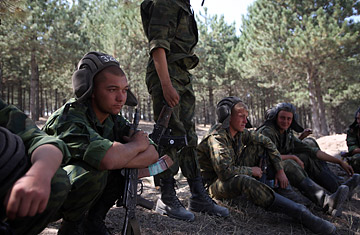
Russian troops wait for the order to pull out of Georgia
A white, red and yellow ribbon flutters gently across a billboard background of blue sky and puffy white clouds, entwined in the center with a white, blue and red-striped ribbon. The billboards, representing the fraternal ties between the breakaway republic of South Ossetia and Russia, have sprung up all over Moscow in the past few days. Below the ribbons, the slogan "Tskhinvali, We're Together" is written in bold, red block letters.
It's a pretty, airbrushed image. But the reality of Moscow's recognition of South Ossetia and Abkhazia as self-governing states independent of Georgia is far messier than mere brotherly support. Ask prominent pro-Kremlin analyst Sergei Markov, a senior deputy in Prime Minister Vladimir Putin and President Dmitri Medvedev's United Russia party in the state Duma, why Russia risked such provocative action, and the answer is a mix of strategy, revenge for past Western slights and even domestic American politics.
"One of the most important reasons is that Russia must protect Abkhazia and South Ossetia against genocide by the war criminal [Georgian President Mikheil] Saakashvili," says Markov. "Saakashvili is totally militarized and brought in outside support. Washington gave them all of the weapons and it has started to give weapons to the war criminal again."
Second, says Markov, "Russia waited for 20 years to accept South Ossetia and Abkhazia. South Ossetia and Abkhazia never lived together with independent Georgia. Never. The question is, how many years should we wait? Russia now has to make a new course, a new policy."
And then there's Kosovo. Western recognition of the Balkan state after it declared independence from Serbia earlier this year angered Moscow, which promised that the move would have consequences. "If the U.S. and Britain think they are first-level countries and Russia a second-level country, we don't agree," says Markov. "We are the first sort. If you recognize that Kosovo is an independent country, fine. We will do the same [with other countries]."
Finally, says Markov, Russia's strong military response was a type of warning. "This is a strong message to everybody. Those who think that aggression against Russia is okay should know that there will be a strong response." That, he says, will lead to a "worsening of relations" with the West. "The West is very much afraid of the militarization of Russia. They are afraid Russia will solve its problems the way it did in South Ossetia through military strength."
But Markov says that Russia's leaders see a big distinction between the U.S. and Europe, and will be careful to make that clear. "We know there is a huge difference between the E.U. and the U.S.," he says. "We know that the Bush administration is working for the election of John McCain. The real order to kill South Ossetians came from Dick Cheney. If Obama [becomes] President and investigates how the Iraq war started, Dick Cheney would be imprisoned. The Neocons believe Obama is a weak politician and they will stop him by any means. The main idea is to create imitations of the Cold War between Russia and the West... We know that [to show Obama up] Neocons will carry out another provocation against Russia probably in Ukraine and we are ready for this.
"Russia's interests coincide closely with the E.U. The E.U. is not interested in civil war in Ukraine... Russia will be very careful and not touch the pipelines because they influence many countries. Russia will be quite moderate on this issue. The most important issue is protecting human life, not pipelines. Pipeline politics is the tactic of the Neocons."